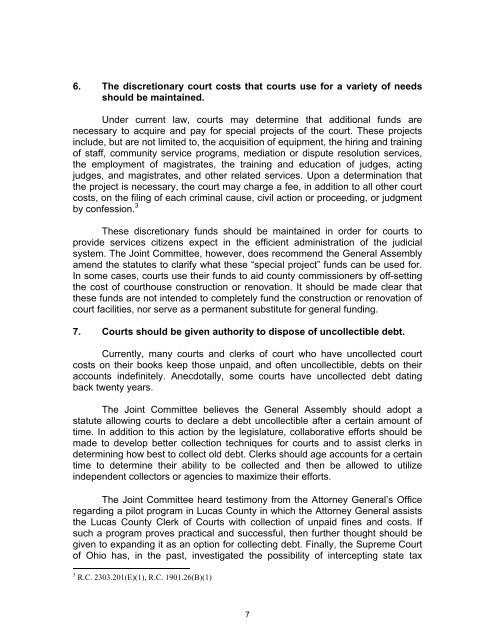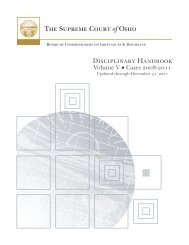The Joint Committee to Study Court Costs and ... - Supreme Court
The Joint Committee to Study Court Costs and ... - Supreme Court
The Joint Committee to Study Court Costs and ... - Supreme Court
You also want an ePaper? Increase the reach of your titles
YUMPU automatically turns print PDFs into web optimized ePapers that Google loves.
6. <strong>The</strong> discretionary court costs that courts use for a variety of needs<br />
should be maintained.<br />
Under current law, courts may determine that additional funds are<br />
necessary <strong>to</strong> acquire <strong>and</strong> pay for special projects of the court. <strong>The</strong>se projects<br />
include, but are not limited <strong>to</strong>, the acquisition of equipment, the hiring <strong>and</strong> training<br />
of staff, community service programs, mediation or dispute resolution services,<br />
the employment of magistrates, the training <strong>and</strong> education of judges, acting<br />
judges, <strong>and</strong> magistrates, <strong>and</strong> other related services. Upon a determination that<br />
the project is necessary, the court may charge a fee, in addition <strong>to</strong> all other court<br />
costs, on the filing of each criminal cause, civil action or proceeding, or judgment<br />
by confession. 3<br />
<strong>The</strong>se discretionary funds should be maintained in order for courts <strong>to</strong><br />
provide services citizens expect in the efficient administration of the judicial<br />
system. <strong>The</strong> <strong>Joint</strong> <strong>Committee</strong>, however, does recommend the General Assembly<br />
amend the statutes <strong>to</strong> clarify what these “special project” funds can be used for.<br />
In some cases, courts use their funds <strong>to</strong> aid county commissioners by off-setting<br />
the cost of courthouse construction or renovation. It should be made clear that<br />
these funds are not intended <strong>to</strong> completely fund the construction or renovation of<br />
court facilities, nor serve as a permanent substitute for general funding.<br />
7. <strong>Court</strong>s should be given authority <strong>to</strong> dispose of uncollectible debt.<br />
Currently, many courts <strong>and</strong> clerks of court who have uncollected court<br />
costs on their books keep those unpaid, <strong>and</strong> often uncollectible, debts on their<br />
accounts indefinitely. Anecdotally, some courts have uncollected debt dating<br />
back twenty years.<br />
<strong>The</strong> <strong>Joint</strong> <strong>Committee</strong> believes the General Assembly should adopt a<br />
statute allowing courts <strong>to</strong> declare a debt uncollectible after a certain amount of<br />
time. In addition <strong>to</strong> this action by the legislature, collaborative efforts should be<br />
made <strong>to</strong> develop better collection techniques for courts <strong>and</strong> <strong>to</strong> assist clerks in<br />
determining how best <strong>to</strong> collect old debt. Clerks should age accounts for a certain<br />
time <strong>to</strong> determine their ability <strong>to</strong> be collected <strong>and</strong> then be allowed <strong>to</strong> utilize<br />
independent collec<strong>to</strong>rs or agencies <strong>to</strong> maximize their efforts.<br />
<strong>The</strong> <strong>Joint</strong> <strong>Committee</strong> heard testimony from the At<strong>to</strong>rney General’s Office<br />
regarding a pilot program in Lucas County in which the At<strong>to</strong>rney General assists<br />
the Lucas County Clerk of <strong>Court</strong>s with collection of unpaid fines <strong>and</strong> costs. If<br />
such a program proves practical <strong>and</strong> successful, then further thought should be<br />
given <strong>to</strong> exp<strong>and</strong>ing it as an option for collecting debt. Finally, the <strong>Supreme</strong> <strong>Court</strong><br />
of Ohio has, in the past, investigated the possibility of intercepting state tax<br />
3 R.C. 2303.201(E)(1), R.C. 1901.26(B)(1)<br />
7
















